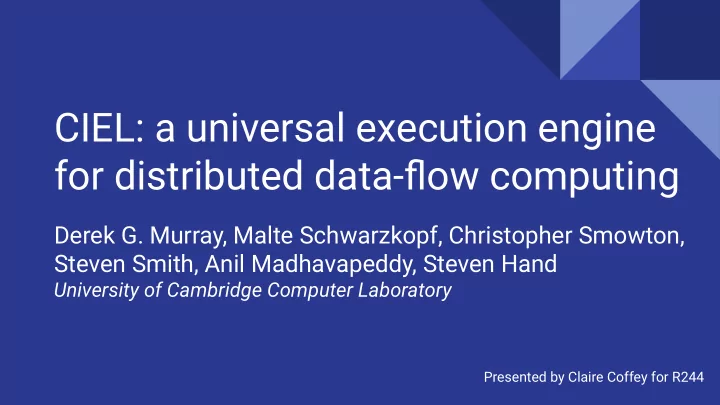

CIEL: a universal execution engine for distributed data-flow computing Derek G. Murray, Malte Schwarzkopf, Christopher Smowton, Steven Smith, Anil Madhavapeddy, Steven Hand University of Cambridge Computer Laboratory Presented by Claire Coffey for R244
Motivations - Other distributed execution engines (MapReduce, Dryad) built for processing large datasets - Did not perform well for iterative algorithms - Poor performance due to design: maximise throughput, not minimise job latency - Latency increases when jobs are chained - CIEL uses data-dependent control flow approach to combat - Work created dynamically based on results of previous computations
Other Research Going On - Also data-dependent control flow: - Google’s Pregel: executing graph algorithms, but only operates on single data set - Solving iterative algorithm difficulties: - CGL-MapReduce: implementation of MapReduce, caches data across jobs - HaLoop: Hadoop extended - Piccolo: programming model for data-parallel programming - Replaces reduce phase of MapReduce with partitioned key-value table
What’s Changed Since - Techniques to aid in flexibility and performance: - Resilient Distributed Datasets - Distributed memory abstraction - Fault-tolerance in in-memory computations - Addresses inefficiencies in iterative algorithms and interactive data mining tools - Naiad - Distributed system, focuses on cyclic dataflow programs
What’s Changed Since - Developments using similar techniques, applied to machine learning: - TensorFlow - Also built to execute data flow graphs across cluster - Dataflow scheduler uses similar algorithm to CIEL - Interface and implementation for machine learning problems - RLGraph - Distributed execution for deep reinforcement learning problems
Problem to Solve - MapReduce, Dryad, etc..., only perform well on some algorithms - Struggle with iterative algorithms - Iterative algorithms require more powerful execution engine - Applications in machine learning and optimisation
Key Ideas: Dynamic Task Graph - Executes programs - Arbitrary data-dependent control flow - CIEL job represented as Dynamic Task Graph (DTG) 3 key primitives interact to form DTG: - - Objects - References - Tasks - Execution data-centric, each job produces 1+ objects - DTG stores relations between tasks and objects
Key Ideas: Dynamic Task Graph Example DTG with corresponding task and object tables Source: D. Murray et al.: CIEL: a universal execution engine for distributed data-flow computing
Key Ideas: Skywriting - Language runs on top of CIEL, designed for data-centric computations - Expresses arbitrary data-dependent control flow with loops and recursive functions, can create tasks - Key features: - ref(url) - spawn(f, [arg,...]) - exec(executor, args, n) - spawn exec(executor, args, n) - Dereference operator (-*)
Key Ideas: Skywriting Example iterative computation in Skywriting input _data - list of n input chunks curr - initialised to list of n partial results Source: D. Murray et al.: CIEL: a universal execution engine for distributed data-flow computing
What They Did: Implementation - Implemented CIEL distributed execution engine and Skywriting language - Goal of development to support a more powerful computation model than existing distributed execution engines - Important not to sacrifice performance
What They Did: Evaluation - Evaluated success by: - Comparison to Hadoop (popular MapReduce system) - Benefits when executing iterative algorithms - Overheads on compute intensive tasks - Effect of master failure on performance - Multiple experiments: - Grep search compared to Hadoop - K-means clustering compared to Hadoop - Binomial Options Pricing : dynamic programming algorithm, difficult to parallelise - Smith-Waterman sequence alignment algorithm: dynamic programming algorithm, difficult to parallelise - Fault Tolerance : master fail-over induced during iterative computation
Evaluation Results - Grep : averaged across runs, CIEL outperforms Hadoop by 35% - K-means : - CIEL faster than Hadoop on all job sizes - Task duration: Hadoop distribution bimodal; 64% “fast” tasks, 36% “slow” tasks; all CIEL tasks “fast” K-Means results Grep results Source: D. Murray et al.: CIEL: a universal execution engine for distributed data-flow computing Source: D. Murray et al.: CIEL: a universal execution engine for distributed data-flow computing
Evaluation Results - Smith-Waterman : - Does not perform well overall - Matrix size 30x30 results satisfactory - Otherwise cannot achieve full utilisation (smaller and larger sizes) - Binomial Options Pricing : - Maximum speedup increases as problem size grows - amount of independent work in each task grows - After maximum, speedup decreases - small tasks suffer from constant per-task overhead - Fault tolerance : - Between failure of master and resumption, 7.7 seconds elapse - Utilisation during second iteration worse - tasks must be replayed - Back to full utilisation by 3rd iteration - Overall job execution time increases
Strengths and Agreements - Good solution for iterative algorithm execution - Alternative engines couldn’t handle this - Useful in machine learning and optimisation - Real problem - Skywriting - easy expression of algorithms - Evaluation looks at results in-depth for algorithm comparisons - e.g. k-means looks at the iteration length, cluster utilisation and map task distribution
Weaknesses and Disagreements - No control over data caching - If configurable could exploit data for faster performance - Programs must be rewritten in Skywriting - only Skywriting programs can create new tasks - Annoying, puts pressure on runtime for interpreted code - Scaling challenges - Multiple cores not used effectively - each executor has full use of machine, limiting efficiency if program is sequential and multiple cores available - Fault tolerance slow - For dynamic programming algorithms, no comparison to alternative engines
Key Takeaways - Satisfies same features as existing distributed execution engines - Additionally, efficient execution of iterative algorithms - Skywriting provides simple way to express iterative algorithms in imperative way, fault tolerant - CIEL performs well in comparison to Hadoop on iterative algorithms - Fault tolerance successful, quite slow - Mixed success on dynamic programming algorithms, but no comparison to alternatives
Impact - Well-received, 287 citations - Good/relevant/interesting - Authors did not publish more on CIEL - Suggests not built upon by authors - Most cite as related and relevant system. Propose either: - Similar system for different problem, e.g Naiad - cyclic data flows - Or applied to specific problem, e.g. TensorFlow - similar scheduling algorithm applied to machine learning
Questions?
Recommend
More recommend